- Home
- Adam Cesare
Clown in a Cornfield Page 2
Clown in a Cornfield Read online
Page 2
Being there, you couldn’t know what the kids watching the livestream had picked up immediately, down in the comments:
OH SHIT, that girl is dead.
One
ONE YEAR LATER
“Wait! Stop!”
The moving truck backfired and then groaned. Asphalt crunched as the vehicle began to roll forward.
“You can’t leave like this!”
Quinn Maybrook watched, helpless, as her dad flung himself against the side of the truck. He steadied himself on the running board. His stringy forearms tensed, gripping the side mirror, climbing up to plead with the driver through clenched teeth.
It would have been a harrowing action-movie scene . . . except the truck was barely moving.
The driver applied the brakes, the truck shuddering and groaning again, and cracked the window:
“Look, Dr. Maybrook, you paid for delivery and load-out, not load-in. We drove overnight to get here and it’s going to be a whole day to drive back to Philly. We have another gig first thing tomorrow—”
“But I—”
“I’m sorry, but we gotta go,” the man said, moving to roll the window back up. Dad slipped his fingers into the gap, putting his weight on the window.
The guy gave him a look that said I will roll up this window and chop off your fingertips but please don’t make me do that because it’ll be a major headache for everyone.
Her dad let go.
“Don’t review us on Yelp!” the driver yelled, hitting the gas. The sudden start shook her dad loose. He stumble-stepped back to where Quinn stood, and they watched the truck pull down the street. All they could do was sigh.
Glenn Maybrook dusted himself off. He adjusted his glasses.
“Well,” he said, clapping his hands as if he hadn’t been trying to wrestle a truck, “I guess we’re here.” Quinn could see that his composure was about to crack. He muttered, began repeating: “We’re here, we’re here . . .”
“Come on, Dad. It’s not a big deal. This isn’t that much stuff,” Quinn said. The move had been harder than expected, though, and now they needed to get everything inside.
Mom would have thought it was hilarious if she were here. But, of course, if Mom were still around, there’s no way that they’d ever have left Philadelphia to move to Kettle Springs, Missouri.
But Mom wasn’t here, and so they were.
Standing in the middle of the street, Quinn looked to the horizon, as if she could go on tiptoes and see the Comcast building back home. When her father told her where they were moving, Quinn had done some quick googling and concluded that the town would be, like, one big cornfield. That it would be quiet, sleepy, and boring. But that wasn’t fair, because already there was more here than she thought there’d be. Which was good—she might be trying to view the town as a yearlong pit stop between her present and her future, but it’d be nice if the year was halfway enjoyable.
Their new house was a five-minute ride from downtown, which they’d driven through on their way in. Main Street seemed to be not just the main road, but the only way out of Kettle Springs, giving the impression that the Missouri town was more a glorified cul-de-sac. Passing through downtown, Quinn noticed a fifties-style diner and a bookstore that was probably all secondhand paperback romances and mysteries where the detectives owned cats. Or the detectives were cats. Not her scene.
But on the brighter side, there was also a second-run movie theater and not one but two thrift stores, one shuttered. The theater and thrift shops would have been full of hipsters back in Philly, but here they were probably what passed for premium, cutting-edge entertainment. She looked forward to checking them out.
Their new street, Marshall Lane, was lined with four houses on each side, and there were indications of life in each. Two houses had big green John Deere tractors parked out front. Or were they riding lawnmowers? Quinn wasn’t sure what the difference was. But she’d learn. She’d learn that and more. Moving to Kettle Springs would be . . . a learning experience.
She looked back to the curb and their earthly belongings. In the early-morning light, what struck her most was how little of the front yard their stuff covered.
Outside of the boxes, most of which were supplies for Dad’s new practice, there was a leather roll-chair with one plastic wheel chipped; two mattresses, different sizes but the same brand; a doll from when she was little that she hadn’t picked up in years and couldn’t believe had made the trip with them; two milk crates of her dad’s old records but no record player; their TV that they’d wrapped in a frayed old comforter; a twine-tied stack of outdated medical journals that would likely wind up in the basement, never to be untied; an old couch that looked older and uglier on the lawn than it ever had in their old trinity apartment; a fading CRT computer monitor; and a poster tube that’d been bent in half during the move—Audrey Hepburn’s face was almost certainly creased forever.
And looming above this assemblage was the house.
The siding was cracked, the windows shimmery, the front door in desperate need of firm sanding and a fresh paint job, and from what Quinn could see, the roof looked like her teeth felt—mossy. (She’d brushed before they’d left, but it had been a long trip with a lot of gas station food.) The bones of a nice house were there—the front porch and its deck swing were charming—but what was on those bones . . . damn.
No time to worry about what she couldn’t change. There was work to do. Getting everything inside would take the better part of the day, and she was determined to get it all done. And quickly. It was still early and she hadn’t spotted any neighbors, but the road to minimal embarrassment was getting everything inside before she and her dad could be seen having a reverse yard sale.
God. Quinn was exhausted. After they got this junk unpacked, she needed sleep. Tomorrow was her first day of school—her second first day of school this year, as it turned out—and she needed to be fresh.
Her dad caught her eye, saw that she’d been taking it all in, and threw up his hands. He gestured to their stuff and looked ready to cry.
“Don’t worry. It won’t take that long,” she said, bending to pull one leg of the couch from where it’d sunken into the dew-damp grass. “But come on. I can’t do it alone.”
On the count of three they each hefted an end of the couch. Dust puffed into the air and Quinn muscled down a sneeze. They should have left it back in Philly. They could have bought another couch, a new couch, one of those sectionals that have cup holders, USB ports, and heated seats. Replacing the furniture had been another opportunity to start fresh that her dad had ignored. Yes, maybe new stuff would have been an extravagance, but her dad was a doctor and the cost of living out here was—he insisted—unbelievably cheap. But even if it weren’t, she’d rather eat rice and beans for a month than live with musty relics of their past life.
The couch smelled like Mom. Fuck, now she was about to cry.
She looked up from the cushions and caught her father staring at her.
“You’re amazing, you know that, kiddo?”
He might have been clueless sometimes, but Glenn Maybrook was often sweet enough he could convince her to push away the hurt.
“Yeah, yeah, yeah, I’m a rock, the wind beneath your wings. Swing your end around, okay? I’ll go up the front stairs first,” she said.
“No, no, I’ll go backward.” It was a chivalrous gesture, volunteering to walk in the difficult direction. But he was kidding himself. Dr. Glenn Maybrook was all knobby elbows and floppy feet and Costco four-to-a-pack reading glasses.
Her mother was the athlete; she was the one who’d pushed Quinn into sports. Like it was for her mother before her, volleyball was Quinn’s game. She was long-limbed and quick, not the tallest girl on her team but with a jump that could get her shoulders up even with the top of the net. Her coaches had been crushed when she told them that the varsity squad would be without her this year, that she was moving to Kettle Springs. They tried to talk her out of it—as if it were her c
hoice. They even volunteered to talk to her father on her behalf.
But the whole move happened so quickly she didn’t even have a chance to tell them no. Dad had received the offer on a Monday and accepted by the following Friday. Within a week they were packing to go. He didn’t ask her what she wanted. He just told her one day after school, framed it like a move halfway across the country was just something he had to do. Like he was telling her he’d already ordered takeout without asking what she wanted.
It was a package deal, a great opportunity: take the business and get the deed to the house. They could start over with just the turn of a key. “Please, Quinn,” he’d asked when he’d finally thought to ask. “We really need a fresh start.”
And maybe he was right.
For Quinn that was the sole appeal to leaving Philadelphia: a new beginning. Or, if not a new beginning, a place she could detox for a year, recuperate before applying to Penn or Temple or any of the Philly-area colleges.
In Kettle Springs she could keep her head down, avoid the drama. No one here knew Quinn as the girl whose mother slumped low in the bleachers during last year’s regionals, then puked down her chin.
Nobody in Kettle Springs knew how Samantha Maybrook had died.
Quinn could start over.
She hefted the couch through the threshold and set down her side in the living room, where the smell of stale sweat and cat piss sent her dashing to throw open the windows.
“Oh, what the hell, Dad?” she said.
“The last owner must have been a cat person . . . ,” her dad said, rubbing his neck.
“And a fu— a freaking shut-in.”
Dad dropped his end of the couch—probably leaving two more half-moon dings in the already ruined hardwood—and crossed to the opposite side of the room, throwing open the rest of the windows in the hope of welcoming in a cross-breeze.
It doesn’t matter. Give him a break on the little stuff.
With the air fresher, but by no means fresh, Quinn took in her surroundings. They were coming from a three-story apartment in Fairmount. A trinity, three small rooms stacked on top of each other, where it wasn’t Sunday if she couldn’t hear their neighbors arguing. They had a postage stamp of grass that Mom liked to joke was her “garden.” Quinn had never lived in a real house in her life, and yet it felt like she knew the layout of the house on Marshall Lane by instinct. Turn here and there is your den. Up there you’ll find the bedrooms. Bathroom is the second door on the right.
There was a level of comfort in that familiarity.
Quinn pulled the couch over against the far wall. They were going to need more furniture, newer furniture, to distract from both the size of the room and the general sense of misery and neglect you got from standing in it.
While they were out furniture shopping, maybe they’d pick up a blowtorch and some accelerant, too.
“Going to grab another box and check out my new room,” Quinn said. “Always wanted to live in an attic.”
Her dad frowned, and she put a hand up before he could start to apologize for things he didn’t need to apologize for.
“No, really. I mean it. There’s a bedroom upstairs with pitched ceilings, right?” she said, remembering the pictures her dad had shared. Then she squeezed out more forced optimism: “This place is actually kind of cool. It’s got . . . personality.”
“I’m glad you like it,” he said, struggling to open the last window and seeming not to hear the snark in her tone. Dad whacked the frame with the heel of his hand and loosened the crumbling paint enough to open the window an inch. “Needs a little work, but it does have promise, doesn’t it?”
Quinn smiled and nodded. With enough work and love, you could save anything.
Well, almost anything.
The screen door slammed behind her, sounding loose, and Quinn leaped down the front stairs in a single bound, grabbing the first box she came to labeled “Quinn’s stuff.”
The house was not as intuitive as she’d first tricked herself into thinking, but after two closets and the hall bathroom, she found the stairs. The stairwell was narrow and the steps were rickety, cracked, and unfinished. No sneaking out of the house, she figured. Or at least more difficult sneaking out.
She climbed the steps. With no banister, she’d have to be careful at night. She set the box down in the middle of the unfinished wood floor and began to take stock.
Bzzt.
It was a message from Tessa. The text read: Gone but not forgotten. Quinn in our hearts 4eva. Under the message, there was an attachment, but her phone was taking forever trying to download it, the blue progress circle only a quarter filled.
The cat-piss smell in the living room was one thing, but Dad better hurry and get the Wi-Fi sorted.
There was a BANG downstairs, and Quinn rushed to listen at the top stair.
“Dad! You okay?”
“Yeah, yeah, yeah . . . ,” he yelled back, sound carrying disconcertingly well through the empty house. “But we’re going to need a new screen for the door.”
Quinn forced a sigh, then a deep breath, pulse still quick. Glenn Maybrook was wrecking the house already, but at least he hadn’t killed himself. She wasn’t a complete orphan, not yet.
Outside, the sun was rising higher. Quinn pulled open the blinds on the window overlooking Marshall Lane. The effect was immediate, the room warmed with the sunlight.
She turned to get the box she’d brought up and whacked her head on the sloped ceiling as she did.
Fucking pitched ceilings.
Quinn muttered something awful, rubbing her skull and realizing she would need to crawl on her knees if she wanted to touch the north or south walls of her new bedroom.
Below the angle of the ceiling to one side was a vintage metal bedframe and a mattress that looked like it belonged in a movie about the Civil War. There was also a simple desk pushed against the wall under the window that faced Marshall Lane. The red luster of the wood was enough to let Quinn know the desk was real furniture, not cheap particleboard.
The house’s former owner was also the town’s former doctor. Glenn Maybrook had taken over his practice on Main Street. Quinn didn’t realize that Dad had bought the house partially furnished, if that’s what you could call the furniture in the attic, and she suspected neither did he. But whatever. She wasn’t going to touch that mattress with her bare skin, but having a few things already here would make life easier. No trips to IKEA, if there even were IKEAs in the Midwest. No late nights trying to put together bedframes with just an Allen wrench and twenty-seven-step Swedish-language instructions. But no veggie meatballs or lingonberry sauce, either, so it was a give and take.
Quinn checked her phone. The attachment had finally downloaded. Tessa had sent a short loop of her and Jace each emptying a carton of apple juice into the cafeteria’s garbage can. They were pouring one out for Quinn. The text on-screen paraphrased Boyz II Men, something about the end of the road. Quinn smiled, remembering the three of them driving around Philly, singing at the top of their lungs.
She watched the video a few more times, then felt her vision blur. It wasn’t the memory of cruising South Street that made Quinn’s heart hurt, but the fact that she’d be receiving fewer and fewer texts like this over the coming weeks.
It sucked, but the friends were bound to drift apart. She loved Tessa and Jace, but their joke felt too true; soon enough, Quinn would be dead to them.
Quinn sent back a quick lol and allowed her phone to autocorrect to the leaning-sideways-crying-laughing emoji. No. She couldn’t spend the day texting with her old friends. There was work to be done. She needed to get busy starting over.
She put down her phone on the desk and glanced out the window.
Dad was on the front lawn, talking to a kid who looked about her age. He had short dirty-blond hair and was wearing jeans and a plaid button-down shirt that made him look like a lumberjack. Hanging off his shoulder was a camo-colored backpack that appeared mostly held together by safety
pins.
Backpack. He’s going to school.
Oh shit! Dad’s meeting him first.
The boy extended a hand, her father shaking it, and laughing at . . . Well, whatever Glenn Maybrook was laughing at, Quinn couldn’t quite tell.
Dad pointed at a box and Quinn could see the boy’s lips ask: “You need some help?”
But her dad waved away the boy’s offer, then said something that—in hindsight—must have been “Don’t worry, my daughter and I can handle it.” Glenn Maybrook half turned and pointed up to the window, and Quinn locked eyes with her new classmate.
Glenn Maybrook waved, goofy as ever, as the boy nodded a restrained hello up to her. Quinn didn’t return the greetings; she just took a big step back into the attic and wished that she could disappear entirely into the gloom. She stood, not breathing, out of their line of sight and counted to thirty. When she dared return to the window, the boy had stopped looking up. He was walking away down their street, backpack hitched to both shoulders.
A moment later, there was the sound of her dad fighting with the broken screen door. “That was the neighbor!” he yelled up. “Don’t worry, I didn’t embarrass you!”
“Not your call to make,” Quinn yelled back from the corner of her empty room.
The floorboards creaked as she crossed the attic room. Everything in this house seemed to creak. And all the creaks meant there would be no hiding from her dad. No staying up late and pacing, picking at her homework until dawn. Which sucked, because that was her process.
Moving to the window at the opposite end of her bedroom, the one facing the backyard, she despaired. There were no blinds, no drapes. But then again: there were also no neighbors facing the back of the house.
The back lawn was uneven and overgrown, with spots of dead grass and a birdbath tilted at such an angle that it probably wasn’t bathing many birds.

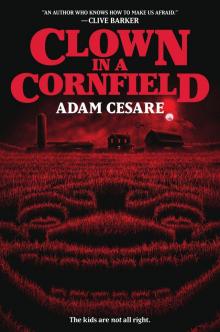 Clown in a Cornfield
Clown in a Cornfield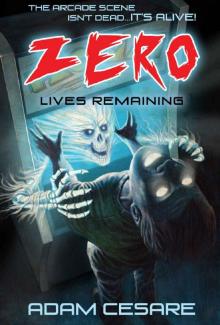 Zero Lives Remaining
Zero Lives Remaining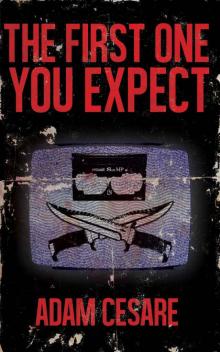 The First One You Expect
The First One You Expect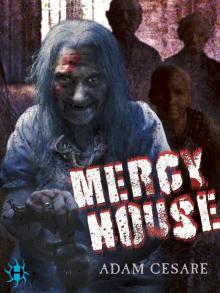 Mercy House
Mercy House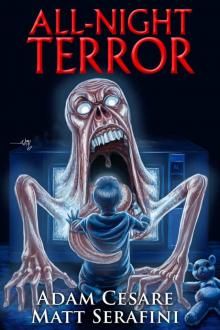 All-Night Terror
All-Night Terror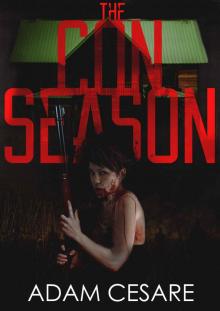 The Con Season: A Novel of Survival Horror
The Con Season: A Novel of Survival Horror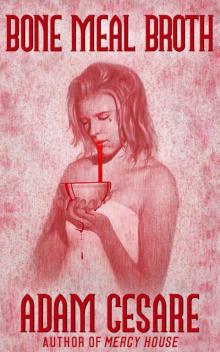 Bone Meal Broth
Bone Meal Broth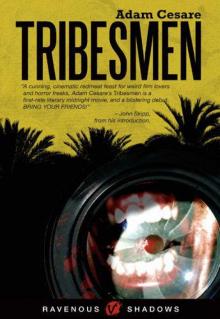 Tribesmen
Tribesmen